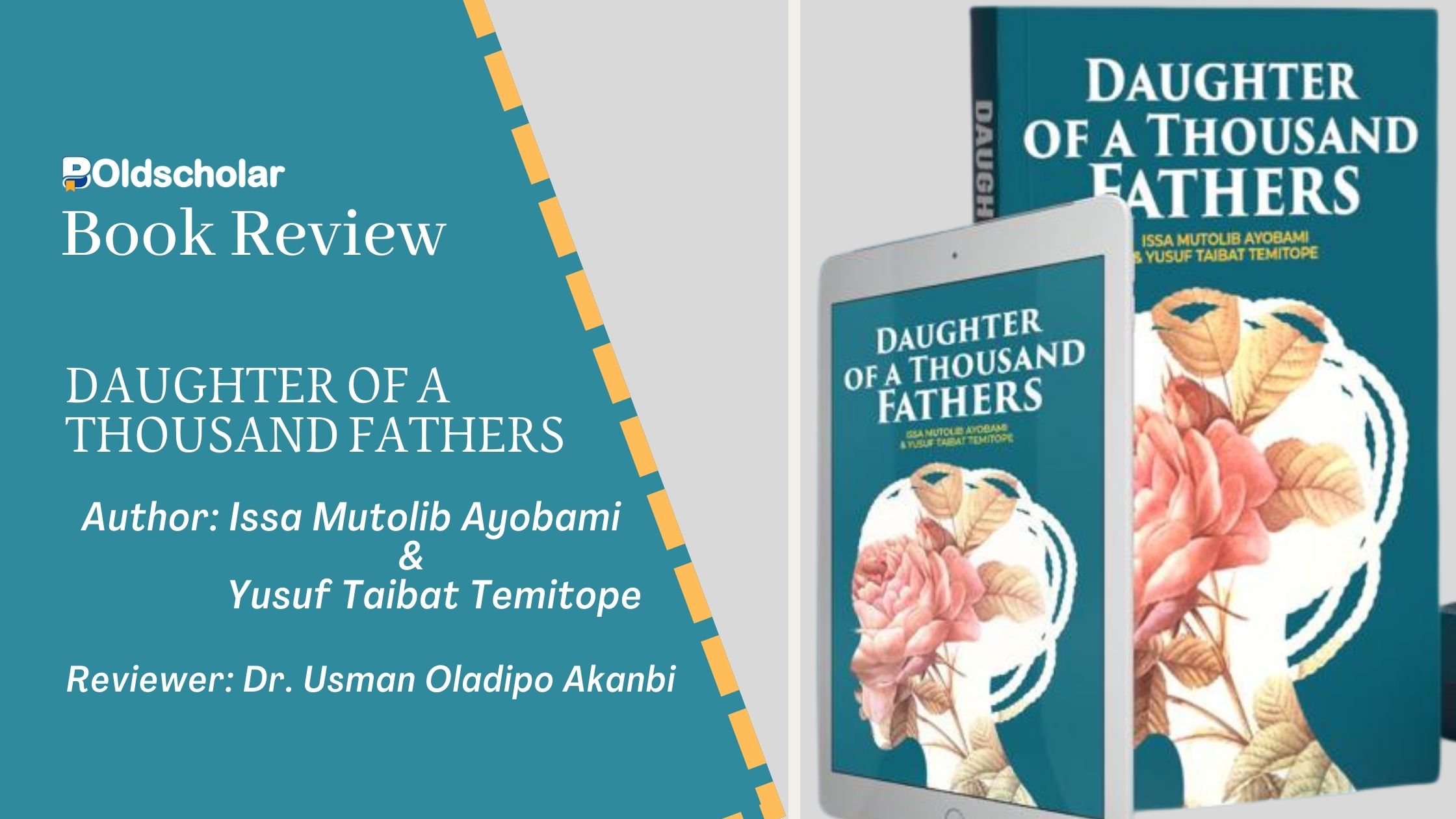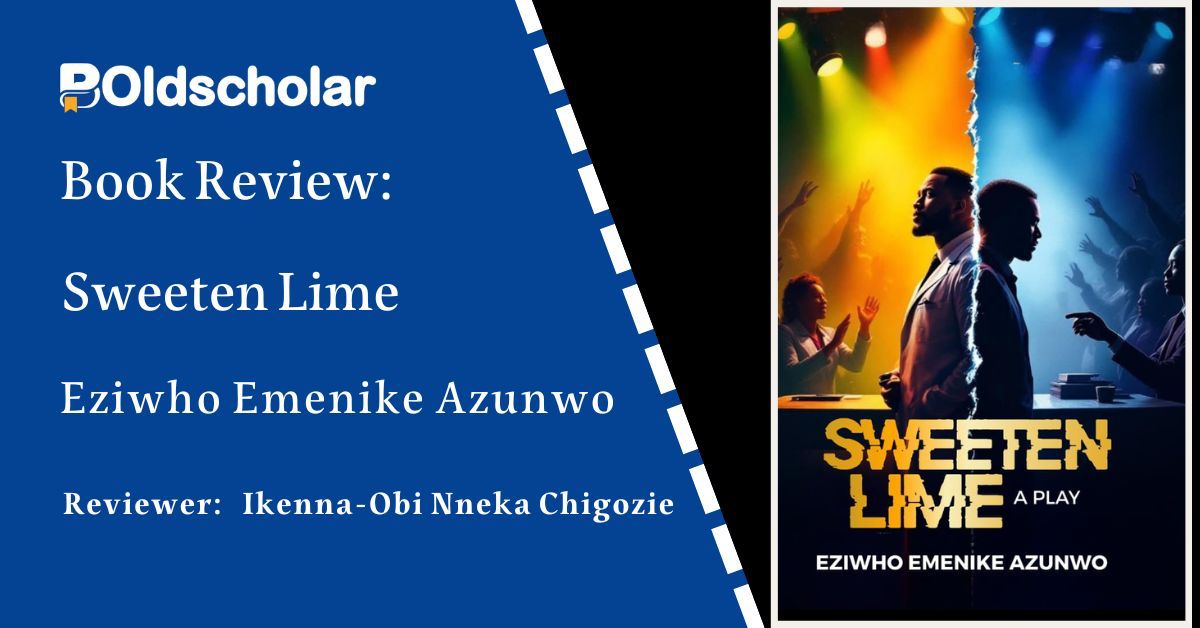Title: Daughter of A Thousand Fathers
Authors: Issa Mutolib Ayobami & Yusuf Taibat Temitope
Reviewer: Dr. Usman Oladipo Akanbi
Publisher: Emergence Publishers
Pagination: 113
Year of Publication: 2023
“To save a girl is to save generations.”
— Gordon B. Hinckley.
The greatest forms of literature often center on that grand spread of phenomena which some refer to as the human condition and experience. In other words, the books which deeply resonate with us are those which deftly and honestly portray human life. And such is the power of good fiction that we can understand life through artistic language that mirrors and recreates lived realities. And good literature such as the sort set to be reviewed here can do more than just entertain or educate; it can be instrumental towards highlighting the importance of empowering and nurturing girls for global development. As the authors state, this book is dedicated to “all the women in the world”, especially the girl child, who should be loved, protected and empowered, according to H. E. Toyin Ojora Saraki, who penned the novel’s foreword.
Daughter of A Thousand Fathers is a stellar literary effort by the duo of Issa Mutolib Ayobami & Yusuf Taibat Temitope, unfolding a riveting story over ten chapters of intense human drama, didactic writing and thrilling plot twists. We first meet one of its main protagonists — Saliu, a handsome young man of admirable character whose upbringing in a good home sets him on a path towards bright prospects. As Saliu’s father tells him, “I am not rich, neither am I poor, but I have vowed to give all my children the best legacy, which is education” (p. 6) This is how the novel quickly establishes the importance of formal education, a theme which recurs over much of the story’s progression. We are also introduced to Ajike, a young lady whose beauty and endearing personality hides an “emotional scar” (p. 8). While Saliu’s path appears straight and fortunate, hedged by shades of academic brilliance, moral uprightness and bountiful support, Ajike walks a much more rugged road, one which starts out smooth but is quickly destroyed by negative sexual encounters with depraved men.
With Ajike and her pitiable travails, Ayobami & Temitope deftly intimate us with the guilt, shame and stigma attached to the survival or plain endurance of abuse. The difficult theme of trauma is also treated within the text, as Ajike’s painful experiences imbed her psyche so deeply that she finds it hard to entertain intimate advances from another man, even when such advances come with the purest of intentions. This representation falls under the concept of Trauma Theory in literature, which contains studies into the effects of traumatic experiences on a victim's memory, identity, linguistic expressions and social interactions. For Ajike, the trauma morphs into a stain which unfairly defines her as a damaged girl, placing her in a low moral category with people like Bolatito, the promiscuous palace maid. This burden puts her in a psychological dilemma where she becomes “...a prisoner within her own body” (p. 27), constrained as she is by societal expectations, limited choices, religious condemnation and the basic biology of bearing an unwanted life. To be mired in such a pit of misery is unimaginable, and coping becomes herculean, so much so that the mind considers self-destruction as a pathway to escape. Fortunately, Ajike’s recourse to illegal abortion is prevented from taking not just the child's life but hers as well, due to the timely intervention of her Aunty Mosun.
Even past the point where she almost dies, her soiled past keeps causing people to either avoid her or resist having her as part of their family, as in the case where this is raised as a point of disqualification against her intended marriage to Saliu. As such, it can be seen that just as Ajike fears, the “scar” of her plight becomes “her emblem, one that everyone could see” (p. 34). Hence, Daughter of A Thousand Fathers establishes that traumatic experiences of sexual abuse are harder for girls to bear into womanhood, especially when it becomes generational: on one hand, the shameful stigma extends to Ajike’s father who “... could still feel the pains inflicted on his psyche by her traumatic experience” (p. 67); and on the other hand, the ridicule of not knowing who her real father is causes Ajike’s daughter, Safiyyah, to lose her “strong and bold personality” (p. 50).
However, not everything is bleak and grim in the text, as hope shines through still. This is due to the form of good relationships, one being that of mother and child. Past the burden of shame that the world tries to place on them, Ajike and her daughter develop a bond reminiscent of that which was shared between Ekwefi and Ezinma in Chinua Achebe's Things Fall Apart. For Ajike, this bonding assumes great significance due to the fact that she lacked motherly guidance due to her own mother's demise. Another important relationship is that of Ajike’s friendship with Saliu, whose unassuming care and generosity of spirit makes her “... glad that at last there was someone who genuinely looked out for her and wanted her to produce a better version of herself” (p. 57). Not only does Saliu see the best in Ajike, but he also invests intentionally towards making sure her aspirations become reality. This leads to another aspect of this duo’s relationship, as the authors carefully cultivate their blooming romance on a fertile foundation of mutual respect, admiration and care: as such, the love shared by Ajike and Saliu is not only pure but beautiful and true. And it is instructive that their affections do not get in the way of their lives, as they both pursue their academic paths with diligence while also remaining religiously devout and loyal to their respective families. This is how Daughter of A Thousand Fathers succeeds in portraying the best type of youthful romance in any category of African literature.
To further showcase their storytelling abilities, the authors introduce a twist to the plot by allowing a rested trouble from the past to reappear, threatening to upset the delicate balance which was carefully curated by Ajike and Saliu. This echoes a tested trope of fiction, in that the past rarely stays dead, but might resurface to trouble the present and even ruin best-laid plans for the future. This twist is in the form of Femi, whose ill-fated teenage romance with Ajike inadvertently set her on a rough and painful path. An intricately woven drama of love and vague feelings ensues, but peters out rather feebly, partly due to the force of bonding shared by the novel’s lovebirds, and also due in part to the commendable maturity which Femi, Ajike and Saliu invest towards disentangling what could have devolved into a messy love triangle. All of this happens against a backdrop of ethno-religious tension which the text offers nuggets of wisdom to, when it states that “... tolerance was key to averting future crises, and since religious leaders are well respected…they could use their influence to promote peace…” (p. 82).
Ultimately, the greatest test to our protagonists arises in the form of yet another cruel twist, one which looms over their carefully constructed assurances. A challenging conflict is introduced to highlight the sad story of planned marriages and such archaic traditions, and our protagonists have to deal with this in their different ways. While Ajike falls back on “... powerful…sensitive…sermons delivered by the Imam” (p. 97), Saliu seeks out the sort of elderly counsel which supports his decision by stating that “A happy marriage with someone with a stained past is better than a sad and frustrating marriage with a saint” (p. 98). As such, Saliu not only succeeds in being allowed to choose the “... person whom I will spend the rest of my life with” (p. 93) but seals his personal decision with the mark of “parental consent and blessings” (p. 97). This tussle of wills illustrates to a larger extent the timeless conflict between old and young, the traditional and the progressive, and the intrigue of observing who ultimately triumphs in a contest between those bound by duty’s dictates, and those who are led by the heart’s desires.
In concluding, Daughter of A Thousand Fathers ends on several positive notes, particularly when it prevents the mistakes of the past from taking the shine off brighter futures ahead of its lovable characters. Spurred by the injustice they suffered, characters like Safiyyah turn “...what was previously used as a weapon against her” (p. 107), to craft protective armour needed to pursue justice, heal and defend other victims. In this vein, the text encourages us to consider its most important theme, which is somewhat encapsulated in the quote from Hinckley which opens this very review: the protection and empowerment of the girl child. The text communicates a weighty charge to society at large, asking us to protect young girls from the abuse and subjugation which still hampers females in this century; it also implies that by keeping them safe, we would be ensuring that the girl child is better prepared to make the most of opportunities needed to realize her fullest potential. As such, the text makes itself accessible to all who would enjoy its deft combination of youthful zest with elderly wisdom. Daughter of A Thousand Fathers is a literary and educational recommendation for young children and teenagers coming of age; adults who love compelling narratives; educational workers seeking morally valuable stories for students; and social activists who need literature that affirms a commitment to gender equality.
It's no wonder Prophet Muhammad (peace be upon him) emphasized the significance of educating and empowering girls. He stated that anyone who effectively educates and supports two girls is guaranteed a place in paradise. This divine encouragement places a great responsibility on all of us to ensure equal opportunities for girls, and it highlights the immense rewards that lie in nurturing their potential. Let us strive to fulfill this noble duty and create a world where every girl can flourish.
The current book cover imagery falls short in capturing the gravity and depth of the content within. However, there is an opportunity for improvement in future editions to better align the cover with the book's serious nature. Taking steps to address this concern will enhance the overall presentation and ensure that potential readers have a clearer understanding of the book's profound content.
All in all, Daughter of A Thousand Fathers not only reaffirms the fact that the girl child is a gift to humanity, but also proves itself to be an impressive offering to our literary landscape and the sort of thoughtful gift one should press into the hands of a friend, a lover, a parent, a teacher, a student, and a girl with dreams.
Share this post





Be the first to comment on this post